Special Communication in Tobacco Control laments South Africa’s regression in tobacco control

South Africa’s global reputation as a leader in tobacco control has been severely undermined by the rise of illicit cigarettes. A recent Special Communication in Tobacco Control, co-authored by Corné van Walbeek and Samantha Filby, shows how illicit trade has reversed decades of progress, costing the fiscus billions and threatening public health.
In the 1990s and early 2000s, tobacco control policy in South Africa was a success story. Large excise tax increases, combined with bans on advertising and smoking in public places, drove down smoking rates. By the early 2010s, smoking prevalence had dropped to below 20%, down from about 32% in the early 1990s. Despite the decrease in tobacco use, inflation-adjusted revenue from tobacco taxes more than tripled over that period.
Sadly, that progress has been reversed. Today, more than half of all cigarettes consumed in South Africa are illicit, sold without the required excise taxes being paid. The availability of cheap, untaxed cigarettes has contributed toward a rise in smoking, with the national smoking rate estimated at 24% in 2021. REEP estimates that the government lost about R15 billion in excise tax revenue each year between 2020 and 2022 due to the illicit cigarette trade, with cumulative losses since 2002 exceeding R100 billion.
The authors emphasise that illicit trade in South Africa is not the inevitable result of “excessive” taxation, as claimed by the tobacco industry. Rather, it is the product of weak enforcement and deliberate tax evasion. Smaller local manufacturers began under-declaring production in the early 2010s, emboldened by the weakening of the South African Revenue Service (SARS) during the state capture years. The dismantling of enforcement units created the space for illicit trade to flourish.
The 2020 COVID-19 sales ban further entrenched the problem. Unscrupulous tobacco companies continued supplying the market with cigarettes, despite the sales ban. Surveys conducted by REEP during the 20-week ban revealed that most smokers did not quit but instead turned to informal markets. Brand loyalties collapsed, and when legal sales resumed, many smokers continued buying cheap, illicit cigarettes.
Despite isolated enforcement actions, systemic interventions remain absent. South Africa has yet to ratify the WHO Protocol to Eliminate Illicit Trade in Tobacco Products, which requires licensing of all supply chain actors and the implementation of a secure digital track-and-trace system. Without such reforms, the authors warn, the illicit market will remain deeply entrenched.
“Illicit cigarettes do not fall from the sky,” they conclude. “They are manufactured, distributed, and profited from by companies that undermine revenue and public health. Unless decisive action is taken, the costs will continue to mount.”
The special communication is available here. It is behind a paywall. For an unpublished version of the paper, please email Corné at cornelis.vanwalbeek@uct.ac.za.
An op-ed about the paper is expected to be published in the Sunday Times on 28 September 2025.
